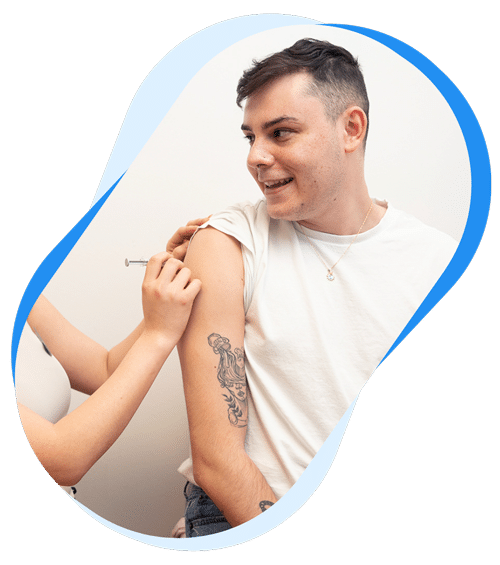Testing & Sexual Health
Resources and support for your sexual well-being including testing and more.


All About Sexually Transmitted Infections (STIs)
Someone’s risk for a certain STI depends on the type of sexual activity. It is important to keep in mind that someone who has acquired an STI may not have immediate symptoms (or obvious ones at all) and can still carry the infection and pass it on to someone else. Some types of infections can end up being long term chronic conditions and others can be treated acutely and can go away.
It is important for anyone who is (or will be) sexually active to be familiar with risks, symptoms, prevention, and where to seek help. Your family doctor, clinics, public health unit, and The PrEP Clinic are all great resources. Anyone who is sexually active is strongly encouraged to test regularly for STIs.
Testing 101
Getting on PrEP is a highly effective way to prevent acquiring HIV, but it doesn’t mean you’ll never get testing. While taking PrEP, you will be screened regularly for HIV and other STIs, so that you can help prevent and treat things like gonorrhea, syphilis, and chlamydia.
It is important to know your status and get regular testing. Some guidelines suggest testing every 3 months for people who are regularly sexually active outside of a monogamous relationship, at minimum once a year.
If you were to start PrEP you would also get regular testing every 3 months .
Local Lab
Most of our patients complete their lab work at LifeLabs or Dynacare locations across the province. You may also have another lab in your area you would prefer to go to. We will provide you with lab requisition forms and swabs to complete the tests locally in your community.
Our Toronto, Brampton, and Ottawa Clinics
If you will be near our in-person locations, you can get all your tests completed on-site during our in-person clinics. Services include: HIV testing, STI treatment, and PrEP starts/continuation. Full panel STI testing is also available to our patients receiving PrEP care.
Public Health Clinics
Your local Public Health Unit may have a sexual health clinic. You can find a location here.

Go swab yourself.
Not completing swabs during sexual health testing? You’re missing out on two super important tests.
Gonorrhea and chlamydia are two common sexually transmitted bacterial infections. Often only a urine test is ordered to test for these but for many people this may not be enough. A urine test only checks that specific part of your body and doesn’t tell you if the bacteria is anywhere else.

Types of Tests on Lab Work
Regular screenings are an important part of your PrEP care with us. We’ll test for the following at every PrEP assessment and in your regular check-ups.
HIV stands for the Human Immunodeficiency Virus and the two main ways it can be acquired include: vaginal/frontal/anal sex and shared needle or drug equipment use. It can only be passed through: blood, semen (including pre-cum), rectal fluid, vaginal fluid, breast milk. You can not acquire HIV from hugging, kissing, or eating a meal made by someone living with HIV.
In 2021, we have highly effective treatment that can keep the virus in such good control that people living with HIV live long healthy lives and can not pass HIV to a sexual partner. (Or to a fetus during pregnancy). This is known as undetectable. Learn more here
Some people may experience symptoms when they first acquire HIV. These can occur 2-4 weeks after and may include: rash, fever, sore throat, and weight loss. Many people do not have any symptoms at first. This is why it is important to get tested. 1 in 7 people living with HIV in Canada are unaware.
If left untreated HIV can lead to health complications, including severe infections and AIDS. This is less common in Canada compared to some other countries as many people have access to care and medication – although there are still many barriers for some. It is important to get on treatment as soon as possible. Many support programs are available to help with the cost of medication and our team can assist you.
It can take 4 weeks after a risk for 95% of people to test positive on an HIV test, 6 weeks for 99%. There is currently no vaccine for HIV but PrEP is a medication people who are HIV-negative can take regularly to reduce their risk by up to 99%. Learn more about it here
Syphilis is a bacterial infection that can be treated with antibiotics. It can be acquired through sexual activity including: oral sex, rimming, and anal/frontal/vaginal sex.
It can take up to 3 months for symptoms to appear. There are different stages for syphilis. In the first stage, one or more painless sores can develop on the genitals, anus or mouth and are infectious. In the second stage, a person may get a rash. If left untreated syphilis can lead to damage to organs like the brain and heart. Screening for this is important during routine sexual health testing.
Once treated a person will need follow-up monitoring to ensure the treatment is effective.
Gonorrhea and chlamydia are common sexually transmitted bacterial infections. These can typically be effectively cured with antibiotics, although some more resistant types (harder to treat) have been found. Symptoms for these are often similar and depend on where the infection is located. These bacteria can be found in the throat, rectum, or genitals. You may not have any symptoms.
Genital symptoms: pain during urination, discharge, itchiness, pain and swelling
Throat symptoms: sore throat, swollen glands
Rectal symptoms: discharge, itchiness, rectal bleeding
Some clinics only do urine testing, and this is not appropriate in most cases. A negative screen in the urine does not mean that gonorrhea or chlamydia are not present in the throat or rectum. And since many people don’t have symptoms, they may not even know they have these infections and can pass them on.
Swab testing at these sites are strongly recommended and we ensure patients at our clinic complete these tests too! For people engaging in oral sex a throat swab is needed, and for people who are the receptive partner (“bottom”) a rectal swab is done as well.
If you are ever treated for gonorrhea of the throat it is important to get a test of cure swab (repeat swab to make sure infection has cleared).
Learn more about the importance of swabbing here: Go Swab Yourself
Hepatitis is a viral infection that can cause inflammation of the liver. There are three types that are routinely screened for: Hepatitis A, Hepatitis B and Hepatitis C. (If on PrEP these are typically screened for once a year).
Hepatitis A is typically more associated with travelling and eating undercooked food, however it can be acquired through some sexual acts such as rimming. Hepatitis A can make a person quite sick however most people do recover from it.
Hepatitis B can be acquired a few ways including through sexual activity. In Ontario, Hepatitis B is part of routine immunization in school but some people either were never vaccinated, or their immunity has worn off. Most people who acquire Hepatitis B will rid of it, however in some people it can remain as a lifelong infection.
In Ontario, Hepatitis A and B vaccines are available free through your local sexual health clinic for people at risk. Patients can also get these for free at our Toronto, Brampton and Ottawa clinics. The clinic team can also prescribe it for you to complete at a local pharmacy.
If you are on PrEP, your care provider should offer these to you if not immune. At The PrEP Clinic we make sure all of our patients are offered the appropriate vaccines for their sexual health. Learn more here
Hepatitis C is more commonly acquired through intravenous drug use but can also be acquired through sex. Hepatitis C was previously a lifelong infection but is now 95% curable. There is currently no vaccine for this specific Hepatitis.
As part of routine sexual health screening, a pregnancy test may also be included.
Sex with Drew
Learn about sexual health questions and answers with Drew Schonbe – the owner and lead pharmacist at the Ontario Prevention Clinic.

Additional Sexual Health Resources
Ontario’s resource for STIs, fertility, and contraception. You can chat online with a nurse or call for assistance. The site also provides locations to get tested in your region.
Provides information on HIV and Hepatitis C risks, prevention, and treatment options. Check out their Safer Sex Guide here: http://librarypdf.catie.ca/PDF/ATI-20000s/26536.pdf
Provided by CATIE, you can search for available HIV and Hepatitis services near you.
ACT offers a variety of mental health, sexual health and substance use supports to cis and trans gay, bi and queer (GBQ) guys. Women’s Community Development Coordinators and a Women’s Support Coordinator provide services geared for Cis-, Trans-, 2SLGBTQ+ women. The Community Counselling program offers sexual health, mental health and substance use support to GBQ guys regardless of their HIV status in bathhouses, Maple Leaf Medical Clinic and Church Wellesley Health Centre, and on-site at ACT. The Gay Men’s Group Programs offer group based support to GBQ guys on a variety of topics, including wellness, body image, validation, crystal meth and sex, and intimate partner violence. Anonymous point-of-care HIV testing is available on Wednesday evenings from 4:00-8:00pm and a community counsellor is available during this time on a drop-in basis, regardless of test result.
It is important for anyone planning to become pregnant to get tested for HIV. Treatment before becoming pregnant or early on in pregnancy can prevent transmission to your baby. In fact, if a person living with HIV is undetectable before pregnancy or early on they will not transmit the virus to their baby.
If you are an Ontario resident under 25 without insurance, have public coverage, or private insurance many birth control options are covered by insurance. For those under 25 many would even be free. The “morning-after pill” is covered with a prescription by public insurance plans (it is important to take ASAP).
BirthControlForMe.ca
Compares the benefits and disadvantages of different birth control methods.
https://www.birthcontrolforme.ca/
Morning After Pill Manufacturer Website
Their site includes an effectiveness calculator, how it works, and many frequently asked questions.
With the landmark “Me Too” movement we are reminded of the importance of the conversation on consent. The basic definition of consent is “when an individual gives their own permission”.
This may seem like a basic concept on the surface, however there can be (and certainly has been in many cases) some confusion or lack of understanding on what exactly it means and where it occurs in our day to day lives. Coercion, bullying, harassment, incapacitation, silence, and fear can also impact whether an individual has truly given consent.
https://www.youtube.com/watch?v=raxPKklDF2k
https://www.youtube.com/watch?v=laMtr-rUEmY
If you need assistance removing photos from the internet visit: https://needhelpnow.ca/app/en/removing_pictures-facebook
